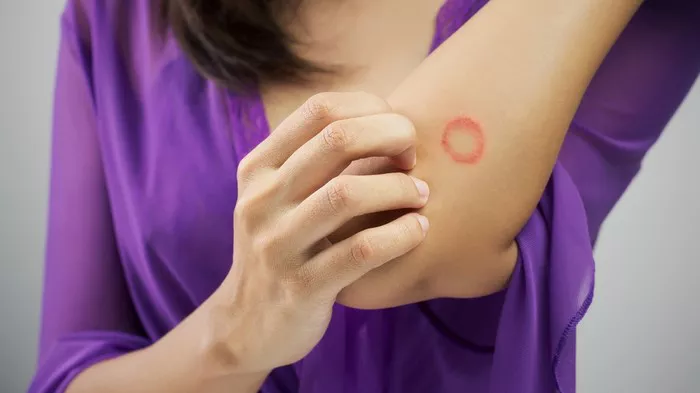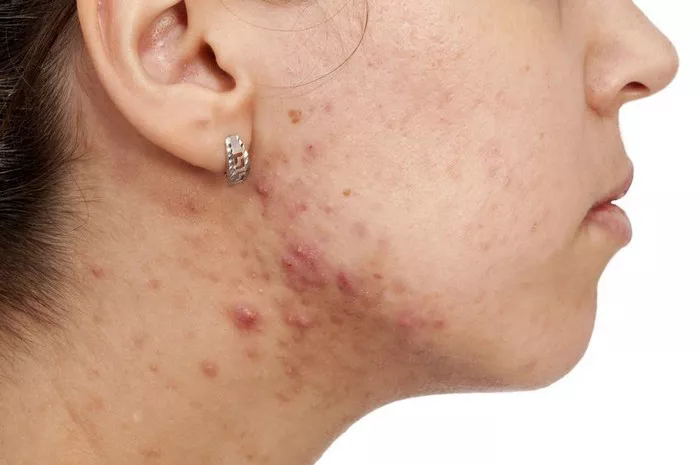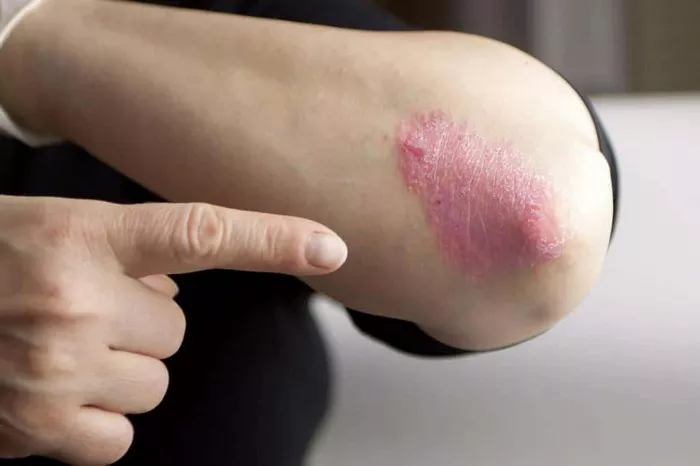Ringworm, despite its misleading name, is not caused by a worm but by a group of fungi called dermatophytes. These fungi thrive on keratin, a protein found in skin, hair, and nails, making these areas susceptible to infection. Ringworm is highly contagious and can spread through direct skin-to-skin contact, contact with contaminated objects, or from infected animals.
The primary symptom of ringworm is a red, circular, and itchy rash with raised edges and a clear or scaly center. It can appear anywhere on the body but is commonly found on the scalp, feet (athlete’s foot), groin (jock itch), and body (tinea corporis). Other symptoms include:
- Scalp: Scaly, bald patches with itching.
- Feet: Red, blistering, or peeling skin, especially between the toes.
- Groin: Red, itchy, and often ring-shaped rash.
Diagnosing Ringworm
Diagnosis of ringworm is typically straightforward, based on the appearance of the rash. However, a healthcare provider might perform additional tests to confirm the infection and rule out other conditions. These tests include:
- Skin Scrapings: Examining a sample under a microscope.
- Wood’s Lamp: Using ultraviolet light to detect certain fungi.
- Fungal Culture: Growing the fungus in a lab to identify it.
Treatment Options for Ringworm
Treating ringworm effectively requires antifungal medications, which can be topical or oral. The choice of treatment depends on the infection’s severity, location, and response to initial therapy.
1. Topical Antifungals
For mild to moderate cases, topical antifungals are usually effective. These medications come in various forms, such as creams, lotions, and ointments. Common topical antifungals include:
- Clotrimazole
- Miconazole
- Terbinafine
Apply these medications directly to the affected area as prescribed, usually for at least 2-4 weeks. It’s crucial to continue the treatment for the entire duration, even if the symptoms seem to improve, to ensure the infection is completely eradicated.
2. Oral Antifungals
For more severe or widespread infections, or for infections of the scalp or nails, oral antifungals may be necessary. These medications include:
- Griseofulvin
- Terbinafine
- Itraconazole
Oral antifungals are typically prescribed for a few weeks to a few months, depending on the infection’s location and severity. As with topical treatments, it’s important to complete the full course to prevent recurrence.
Signs That Your Ringworm Is Healing
Monitoring the healing process of ringworm is essential to ensure that the treatment is effective and to prevent spreading the infection to others. Here are key signs that your ringworm is going away:
1. Reduction in Itchiness and Redness
One of the earliest signs of healing is a noticeable reduction in itchiness and redness. The rash may still be visible, but it should become less inflamed and irritated as the antifungal medication starts to work. Persistent itchiness or worsening redness may indicate that the treatment is not effective or that there is an underlying issue.
2. Decreased Size of the Rash
As the treatment progresses, the ringworm rash should gradually shrink in size. The edges of the rash may become less distinct, and the clear or scaly center may start to blend in with the surrounding skin. It’s a positive sign if the rash becomes less noticeable over time.
3. Flaking and Peeling
Flaking and peeling of the skin are common during the healing process. This is a normal response as the infected skin cells are shed and replaced with healthy ones. It’s important to avoid picking at the peeling skin to prevent secondary infections and scarring.
4. Return to Normal Skin Color
As the infection clears up, the affected skin will begin to return to its normal color. Any discoloration caused by the rash should gradually fade. In some cases, there may be temporary pigmentation changes, which should resolve over time with proper treatment and skin care.
5. Absence of New Lesions
If no new ringworm lesions appear, it is a good indication that the infection is under control. Continued observation for new spots or rashes is important to ensure that the infection has not spread or recurred.
Maintaining Hygiene and Preventing Recurrence
Even if the ringworm appears to be healing, maintaining proper hygiene and taking preventive measures are crucial to avoid recurrence and spreading the infection to others. Here are some tips:
1. Personal Hygiene
Keep the Affected Area Clean and Dry: Fungi thrive in warm, moist environments. Keeping the skin clean and dry helps prevent the infection from worsening.
Regularly Wash Hands: Washing hands frequently, especially after touching the infected area, reduces the risk of spreading the fungus.
Use Separate Towels and Clothing: Avoid sharing towels, clothing, or personal items with others. Wash these items frequently in hot water.
2. Environmental Hygiene
- Disinfect Surfaces and Objects: Clean and disinfect surfaces and objects that may have come into contact with the infected area, such as gym equipment, shower floors, and combs.
- Launder Bedding and Linens: Wash bedding, towels, and clothing in hot water to kill any remaining fungi.
- Avoid Walking Barefoot: In communal areas like locker rooms and swimming pools, wear protective footwear to prevent fungal infections.
3. Lifestyle and Dietary Considerations
- Boost Immune Health: A healthy immune system can help fight off infections. Maintain a balanced diet, exercise regularly, and manage stress.
- Avoid Tight or Non-Breathable Clothing: Wear loose-fitting, breathable clothing to reduce moisture buildup on the skin.
- Monitor Pets: Pets can be carriers of ringworm. Regularly check and treat your pets for any signs of fungal infections.
When to Seek Medical Advice
While most cases of ringworm can be treated with over-the-counter antifungal medications, certain situations require medical attention:
1. Persistent or Worsening Symptoms
If the ringworm symptoms persist or worsen despite treatment, consult a healthcare provider. This could indicate that the infection is resistant to the medication or that there is an underlying condition affecting the immune system.
2. Severe or Widespread Infection
For severe or widespread infections, oral antifungal medications prescribed by a healthcare provider may be necessary. These infections are more difficult to treat and require professional supervision.
3. Infection of the Scalp or Nails
Scalp and nail infections are particularly challenging to treat with topical medications alone. Oral antifungals and specialized treatments are often required for effective management.
4. Complications or Secondary Infections
If there are signs of complications, such as secondary bacterial infections (e.g., increased redness, swelling, pus, or fever), seek medical advice promptly. These conditions require additional treatment to prevent further health issues.
SEE ALSO: Does Ringworm Cause Hair Loss?
Natural and Home Remedies: Do They Work?
While antifungal medications are the most effective treatment for ringworm, some natural and home remedies may provide supplementary benefits. However, these should not replace medical treatments, especially for severe cases. Here are some commonly used remedies:
1. Tea Tree Oil
Tea tree oil has antifungal and antibacterial properties. Applying diluted tea tree oil to the affected area may help reduce symptoms. Always perform a patch test first to ensure there is no allergic reaction.
2. Apple Cider Vinegar
Apple cider vinegar has natural antifungal properties. Diluted apple cider vinegar can be applied to the ringworm with a cotton ball. However, it should not be used on broken skin as it can cause irritation.
3. Coconut Oil
Coconut oil contains lauric acid, which has antifungal properties. It can be applied directly to the skin and is generally safe for use. Coconut oil may help soothe and moisturize the skin during the healing process.
4. Aloe Vera
Aloe vera has soothing and healing properties that can help reduce itchiness and inflammation. Applying fresh aloe vera gel to the affected area may provide relief and support the healing process.
5. Garlic
Garlic has natural antifungal and antimicrobial properties. Crushed garlic can be mixed with olive oil and applied to the ringworm. However, garlic can cause skin irritation in some people, so use with caution.
Conclusion
Recognizing the signs of healing and adhering to the full course of treatment are crucial steps in recovering from ringworm. Maintaining good hygiene practices and taking preventive measures will help ensure that the infection does not return or spread to others. If in doubt, or if symptoms persist, consulting a healthcare provider is always the best course of action. Through proper care and attention, you can successfully manage and overcome ringworm, restoring your skin to health.
Related Topics:



























